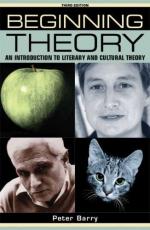
|
| Name: _________________________ | Period: ___________________ |
This test consists of 5 multiple choice questions, 5 short answer questions, and 10 short essay questions.
Multiple Choice Questions
1. In the chapter titled "Narratology", ________ means slow telling where an author stages a tale for readers whereas ________ means relating where the narrator summarizes events without trying to create an illusion.
(a) Metonymy / metaphor .
(b) Mimesis / diegesis.
(c) Langue / parole.
(d) Paradigm / paradigmatic.
2. The narrator believes that after the moment of theory there comes, inevitably, the ________ of theory, when it ceases to be the exclusive concern of a dedicated minority and enters the intellectual bloodstream.
(a) Year.
(b) Week.
(c) Month.
(d) Hour.
3. The narrator details that ________ believed that some speech was reported while other speech was mimetic, transposed, or narratized.
(a) Galileo Galilei.
(b) Aristotle.
(c) Genette.
(d) Plato.
4. ________ read major works from an ecocritic point of view and extend the application of concepts to areas other than the natural world.
(a) Ecofeminists.
(b) Ecocentrists.
(c) Ecocritics.
(d) Ecologists.
5. Who argued in 1905 that literature must become an instrument of the party and that "literature must become Party literature"?
(a) Keats.
(b) Lenin.
(c) Reis.
(d) Tennyson.
Short Answer Questions
1. The ancestry of post-colonial criticism can be traced to Frantz Fanon's ________, published in French in 1961, and voicing what might be called "cultural resistance" to France's African empire.
2. Stylistics is the modern version of the ancient discipline known as ________, which taught its students how to structure an argument.
3. According to Marxist literary criticism, what term is best defined as an outlook, values, tacit assumptions, half-realized allegiances, etc. and having a major bearing on what is written by a member of a social class?
4. What is the term used to describe the study of narrative structures that combines characteristics and is derived from structuralism and linguistic theory?
5. A poem of which author is provided by Peter Barry as an example of ecocriticism?
Short Essay Questions
1. Briefly discuss what post-colonial critics do according to the narrator.
2. What does ecocriticism study? What is another term for ecocriticism?
3. Briefly explain new historicism as it is described by the author.
4. Who are Cheryll Glotfelty and Harold Fromm? Explain the ecocriticism movement.
5. Who was Karl Marx?
6. What is the aim of Marxism, according to the narrator?
7. Explain what liberal humanism and stylistics have in common.
8. Explain the meaning of "adopt," "adapt," and "adept" phases as they relate to post-colonial criticism.
9. What do ecocritics do according to Peter Barry?
10. Briefly define "mimesis" and "diegesis" as determined by Peter Barry.
|
This section contains 826 words (approx. 3 pages at 300 words per page) |

|




